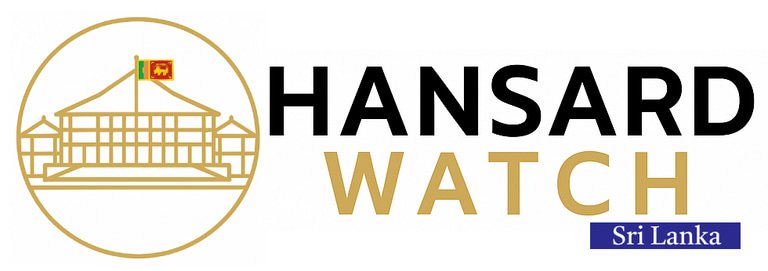Sign up to get early access to THE Artificial intelligence (AI) Hansard tool
Useful Information
Essential Sri Lanka Governance Links:
Parliament of Sri Lanka - https://www.parliament.lk/
The Official Government News Portal of Sri Lanka - https://www.news.lk/
Transparency International Sri Lanka - https://www.tisrilanka.org/
The Commission to Investigate Allegations of Bribery or Corruption - https://www.ciaboc.gov.lk/
Verité Research platforms - https://www.veriteresearch.org/services-and-products/platforms-trackers/
Manthri.lk (by Verité Research) - https://manthri.lk/
Right to Information - https://rti.gov.lk/
Committee on Public Enterprises - https://www.parliament.lk/component/committees/commitee/showCommittee?id=%209&lang=en
Committee on Public Accounts (COPA) - https://www.parliament.lk/component/committees/commitee/showCommittee?id=%208&lang=en
Centre for Policy Alternatives (CPA) - https://www.cpalanka.org/
People's Action for Free and Fair Elections (Paffrel) - https://www.paffrel.com/
National Audit Office of Sri Lanka - http://auditorgeneral.gov.lk/web/index.php/en/
Election Commission of Sri Lanka - https://www.elections.gov.lk/
Latest Hansards
9th July 2025 - https://www.parliament.lk/uploads/documents/hansard/1752660241032216.pdf
8th July 2025 - https://www.parliament.lk/uploads/documents/hansard/1752482630017444.pdf
30th June 2025 - https://www.parliament.lk/uploads/documents/hansard/1752037071094166.pdf
Previous Hansards - https://www.parliament.lk/en/business-of-parliament/hansards
Hansard mentions in the News
17th July 2025 - AI to record Hansard reports and minutes of Parliament committee meetings - https://www.adaderana.lk/news.php?nid=110584
Essential Terms in Sri Lankan Parliamentary Proceedings
Hansard – The official written record of everything said in Parliament, like a detailed transcript.
MP (Member of Parliament) – An elected representative who speaks and votes in Parliament on behalf of the public.
Bill – A formal proposal for a new law or to change an existing law. It needs to be approved by Parliament to take effect.
Act – A bill that has been passed by Parliament and officially becomes law.
Motion – A formal suggestion made by an MP for Parliament to discuss or take action on a matter.
Resolution – A decision made by Parliament after voting on a motion, expressing collective agreement.
Order Paper – The agenda for a particular day in Parliament, listing all scheduled business and topics for discussion.
Standing Orders – The official rules that govern how Parliament operates, including procedures and conduct.
Speaker – The MP who acts as the chairperson or referee in Parliament, ensuring debates are fair and orderly.
Serjeant-at-Arms – An official responsible for maintaining order and security within Parliament, also performs ceremonial duties.
Committee Stage – The phase where a bill is examined in detail by a smaller group of MPs who can suggest changes.
Second Reading – A stage in the passage of a bill where the general idea is debated by MPs.
Third Reading – The final stage of debating a bill before it becomes law, with only minor adjustments allowed.
Adjournment – The official pause or end of a parliamentary session for the day.
Quorum – The minimum number of MPs that must be present for Parliament to carry out business legally.
Division – A formal voting process where MPs physically separate into groups to show their vote.
Majority – When more than half the MPs support a motion or bill, allowing it to pass.
Opposition – The political parties that are not part of the ruling government and are responsible for holding it accountable.
Government – The ruling political party or coalition with the most MPs, responsible for running the country.
Minister – An MP assigned to oversee a specific government department, like health or education.
Cabinet – A group of senior ministers chosen by the government to make key national decisions.
Budget Speech – An annual speech outlining the government’s income, expenses, and financial plans.
Point of Order – A formal objection raised when an MP believes the rules of Parliament are being broken.
Privilege – Special protections MPs have during parliamentary sessions, such as freedom of speech without legal consequences.
Interruption – When a speaker is paused or stopped during a parliamentary session, either formally or informally.
Hansard Watch
Transforming Sri Lanka parliamentary proceedings for public understanding with AI.
Contact us
STAY IN TOUCH
hello@hansardwatch.org
© 2025. All rights reserved.
